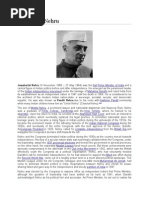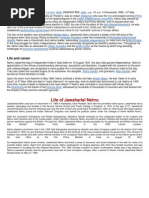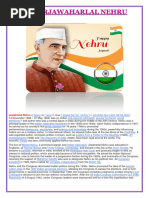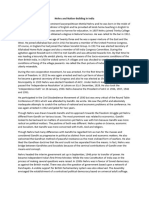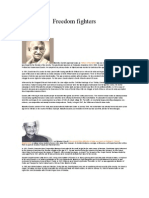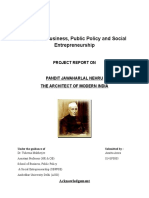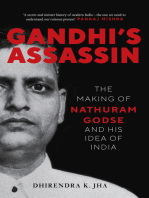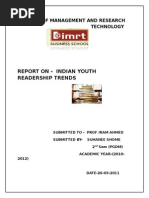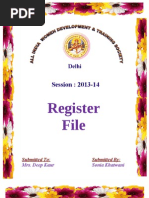Hindustani: (Listen) : Jawaharlal Nehru (
Hindustani: (Listen) : Jawaharlal Nehru (
Uploaded by
kumarrohit352Copyright:
Available Formats
Hindustani: (Listen) : Jawaharlal Nehru (
Hindustani: (Listen) : Jawaharlal Nehru (
Uploaded by
kumarrohit352Original Description:
Original Title
Copyright
Available Formats
Share this document
Did you find this document useful?
Is this content inappropriate?
Copyright:
Available Formats
Hindustani: (Listen) : Jawaharlal Nehru (
Hindustani: (Listen) : Jawaharlal Nehru (
Uploaded by
kumarrohit352Copyright:
Available Formats
Jawaharlal Nehru (Hindustani: [darlal neru] ( listen); 14 November 1889 27 May
1964) was the first Prime Minister of India and a central figure in Indian politics for much of the 20th
century. He emerged as the paramount leader of the Indian independence movement under the
tutelage ofMohandas Karamchand Gandhi and ruled India from its establishment as an independent
nation in 1947 until his death in office in 1964. Nehru is considered to be the architect of the modern
Indian nation-state: a sovereign, socialist, secular, and democratic republic. The son of Motilal
Nehru, a prominent lawyer and nationalist statesman, Nehru was a graduate of Trinity College,
Cambridge and the Inner Temple, where he trained to be a barrister. Upon his return to India, he
enrolled at the Allahabad High Court, and took an interest in national politics, which eventually
replaced his legal practice. A committed nationalist since his teenage years, Nehru became a rising
figure in Indian politics during the upheavals of the 1910s. He became the prominent leader of the
left-wing factions of the Indian National Congress during the 1920s, and eventually of the entire
Congress, with the tacit approval of his mentor, Gandhi. As Congress President in 1929, Nehru
called for complete independence from the British Raj and instigated the Congress's decisive shift
towards the left.
Nehru and the Congress dominated Indian politics during the 1930s as the country moved towards
independence. His idea of a secular nation-state was seemingly validated when the Congress, under
his leadership, swept the 1937 provincial elections and formed the government in several provinces;
on the other hand, the separatist Muslim League fared much poorer. But these achievements were
seriously compromised in the aftermath of the Quit India Movement in 1942, which saw the British
effectively crush the Congress as a political organisation. Nehru, who had reluctantly heeded
Gandhi's call for immediate independence, for he had desired to support the Allied war effort during
the Second World War, came out of a lengthy prison term to a much altered political landscape. The
Muslim League under his old Congress colleague and now bte noire, Muhammad Ali Jinnah, had
come to dominate Muslim politics in India. Negotiations between Nehru and Jinnah for power
sharing failed and gave way to the independence and bloody partition of Indiain 1947.
You might also like
- Jawaharlal Nehru 49Document8 pagesJawaharlal Nehru 49BalrajGoulikar100% (1)
- Jawaharlal Nehru (: HindustaniDocument1 pageJawaharlal Nehru (: HindustanisugupremNo ratings yet
- Jawaharlal Nehru InformationDocument1 pageJawaharlal Nehru InformationJasvinder SinghNo ratings yet
- UstaniDocument1 pageUstaniJitendra Suraaj TripathiNo ratings yet
- Its My ChoiceDocument2 pagesIts My ChoiceLarry WhiteNo ratings yet
- Jawaharlal Nehru Dr. Rajendra Prasad InformationDocument3 pagesJawaharlal Nehru Dr. Rajendra Prasad InformationjasujunkNo ratings yet
- Jawaharlal Nehru Political CareerDocument2 pagesJawaharlal Nehru Political Careershayan husainNo ratings yet
- Jawaharlal NehruDocument5 pagesJawaharlal NehruPrasant NatarajanNo ratings yet
- Jawaharlal Nehru (: - Wah-Hurr - HrooDocument1 pageJawaharlal Nehru (: - Wah-Hurr - HrooGaneshNo ratings yet
- Jawaharlal NehruDocument1 pageJawaharlal Nehrumanagement1997No ratings yet
- Pandit Jawaharlal NehruDocument10 pagesPandit Jawaharlal NehruPrasun Mitra100% (1)
- Mohandas Karamchand Gandhi (: SwarajDocument4 pagesMohandas Karamchand Gandhi (: SwarajRamdassNo ratings yet
- Jawaharlal NehruDocument26 pagesJawaharlal NehruDDKNo ratings yet
- NehruDocument11 pagesNehruapi-3836249100% (2)
- CHAAAKOOODocument2 pagesCHAAAKOOOavneetsinghasr123No ratings yet
- Jawaharlal NehruDocument1 pageJawaharlal NehruJohn Paul BagobeNo ratings yet
- Gurmeet. LeaderDocument4 pagesGurmeet. LeaderGeetika KhannaNo ratings yet
- Chapter - 4Document19 pagesChapter - 4आई सी एस इंस्टीट्यूटNo ratings yet
- Jawaharlal NehruDocument2 pagesJawaharlal NehruSonam GyatsoNo ratings yet
- NehruDocument2 pagesNehruGuna SkNo ratings yet
- History NotesDocument23 pagesHistory NotesDeepanshi YadavNo ratings yet
- Jawaharlal Nehru BioDocument3 pagesJawaharlal Nehru BioAmirtha VarshiniNo ratings yet
- Jawaharlal Nehru BiographyDocument31 pagesJawaharlal Nehru Biographyabhi.c78504No ratings yet
- BornDocument3 pagesBornPranjal MishraNo ratings yet
- JAwlala NehruDocument69 pagesJAwlala NehruAvinash MulikNo ratings yet
- Sociology - Module 3 - Nehru and NationDocument3 pagesSociology - Module 3 - Nehru and Nationhriday kumarNo ratings yet
- Jinnah As A Freedom MovementDocument4 pagesJinnah As A Freedom Movementabdul bari100% (3)
- Freedom FightersDocument5 pagesFreedom FightersSidharth KumarNo ratings yet
- 6.chapter. 1Document49 pages6.chapter. 1Shubham PandeyNo ratings yet
- Prime MinistersDocument6 pagesPrime MinistersChetan AgrawalNo ratings yet
- School of Business, Public Policy and Social EntrepreneurshipDocument31 pagesSchool of Business, Public Policy and Social EntrepreneurshipAmrita AroraNo ratings yet
- A Brief History of IndiaDocument6 pagesA Brief History of IndiaUttam KumarNo ratings yet
- Jawahalal NehruDocument5 pagesJawahalal NehruOswinda GomesNo ratings yet
- GRP 1Document15 pagesGRP 1Harsh TharianiNo ratings yet
- History ProjectDocument3 pagesHistory Projectvaishnavi bansalNo ratings yet
- Jinnah's Works and Career As ALegislator (1921-1929)Document17 pagesJinnah's Works and Career As ALegislator (1921-1929)Fayyaz AliNo ratings yet
- Quaid e Azam Muhammad Ali JinnahDocument2 pagesQuaid e Azam Muhammad Ali JinnahhuzaifaNo ratings yet
- Jawaharlal Nehru Hindi:: Rajendra Prasad Sarvepalli RadhakrishnanDocument18 pagesJawaharlal Nehru Hindi:: Rajendra Prasad Sarvepalli RadhakrishnanKrishan KantNo ratings yet
- Partition of IndiaDocument71 pagesPartition of IndiaShishir Kumar100% (1)
- Jayaprakash Narayan in Underground MovementDocument2 pagesJayaprakash Narayan in Underground MovementNitesh Kotian100% (4)
- Years in England: Muhammad Ali Jinnah (Document4 pagesYears in England: Muhammad Ali Jinnah (Tahir KhurshidNo ratings yet
- India - Political Developments: Party Prime MinisterDocument4 pagesIndia - Political Developments: Party Prime MinisterDileep KumarNo ratings yet
- Father of The Nation Quaid-i-Azam Mohammad Ali JinnahDocument14 pagesFather of The Nation Quaid-i-Azam Mohammad Ali JinnahShazad HassanNo ratings yet
- Womesh Chunder BonnerjeeDocument5 pagesWomesh Chunder BonnerjeeMahesh KumarNo ratings yet
- Quiad e Azam M Ali Jinnah History Muhammad Ali JinnahDocument5 pagesQuiad e Azam M Ali Jinnah History Muhammad Ali JinnahPRINCE YOUNUSNo ratings yet
- Indira GandhiDocument5 pagesIndira GandhiRakesh2280No ratings yet
- AngieDocument7 pagesAngieElmer PiadNo ratings yet
- Role of Muhammad Ali Jinnah in Pakistan Movement Assignment No 01Document6 pagesRole of Muhammad Ali Jinnah in Pakistan Movement Assignment No 01Usama AliNo ratings yet
- Indian National CongressDocument7 pagesIndian National CongressKhushi SalgaonkarNo ratings yet
- Surendranath BanerjeeDocument6 pagesSurendranath BanerjeeAnonymous bNXAc5cNo ratings yet
- The Great Freedom Fighters of India (4)Document14 pagesThe Great Freedom Fighters of India (4)jayaramchowdary09No ratings yet
- Early Life: Jawaharlal Nehru (HindiDocument6 pagesEarly Life: Jawaharlal Nehru (HindiManoj MahapatraNo ratings yet
- Unit 14Document11 pagesUnit 14ujjaini870No ratings yet
- Prime Ministers of IndiaDocument28 pagesPrime Ministers of IndiaRudraksh KhariwalNo ratings yet
- A Brief History of IndiaDocument6 pagesA Brief History of IndiaPunit SalimathNo ratings yet
- Aakriti MahajanDocument45 pagesAakriti MahajanJsmBhanotNo ratings yet
- Quaid e AzamDocument9 pagesQuaid e AzamAwais JillaniNo ratings yet
- Gandhi's Assassin: The Making of Nathuram Godse and His Idea of IndiaFrom EverandGandhi's Assassin: The Making of Nathuram Godse and His Idea of IndiaNo ratings yet
- Social Science Project ON: EarthquakeDocument2 pagesSocial Science Project ON: Earthquakekumarrohit352No ratings yet
- Subject: Quotation For Aluminium Fab. WorkDocument1 pageSubject: Quotation For Aluminium Fab. Workkumarrohit352No ratings yet
- Questionnaire DellDocument15 pagesQuestionnaire Dellkumarrohit352100% (2)
- Product Name Stock Stock in Total Stock in Damage Stock Items Sale Total Amount Remaining Stock StaffDocument2 pagesProduct Name Stock Stock in Total Stock in Damage Stock Items Sale Total Amount Remaining Stock Staffkumarrohit352No ratings yet
- HB A 1C Rhu Eghus DH VKSLR "KQXJ Fu%"Kqyd Tkap F"Kfoj Mk-Lanhi Xqirk Dyhfud Ij Fnukad 25@09@2014 Fnu Czglifrokj Dks GksxkaDocument2 pagesHB A 1C Rhu Eghus DH VKSLR "KQXJ Fu%"Kqyd Tkap F"Kfoj Mk-Lanhi Xqirk Dyhfud Ij Fnukad 25@09@2014 Fnu Czglifrokj Dks Gksxkakumarrohit352No ratings yet
- Sita RamDocument1 pageSita Ramkumarrohit352No ratings yet
- Chemistry Project On "Alloy Analysis": Submitted By: Kartik Agarwal Under The Guidance Of: Rakesh Sethi SirDocument12 pagesChemistry Project On "Alloy Analysis": Submitted By: Kartik Agarwal Under The Guidance Of: Rakesh Sethi Sirkumarrohit352No ratings yet
- Acknowledgemen T: Miss. Surender KaurDocument9 pagesAcknowledgemen T: Miss. Surender Kaurkumarrohit352No ratings yet
- Report On - Indian Youth Readership Trends: Institue of Management and Research TechnologyDocument11 pagesReport On - Indian Youth Readership Trends: Institue of Management and Research Technologykumarrohit352No ratings yet
- Acknowledge Men 12014Document9 pagesAcknowledge Men 12014kumarrohit352No ratings yet
- Graph SamsungDocument4 pagesGraph Samsungkumarrohit352No ratings yet
- Study USA With IDP: Cbse Board Exam Result SSC Graduate Level Exam Icai CPT Exam ResultDocument2 pagesStudy USA With IDP: Cbse Board Exam Result SSC Graduate Level Exam Icai CPT Exam Resultkumarrohit352No ratings yet
- The Invention of The Wheel: Bearing Wheel and Axle Six Simple MachinesDocument2 pagesThe Invention of The Wheel: Bearing Wheel and Axle Six Simple Machineskumarrohit352No ratings yet
- Curriculum-Vitae: Ashish KumarDocument2 pagesCurriculum-Vitae: Ashish Kumarkumarrohit352No ratings yet
- AluminiumDocument1 pageAluminiumkumarrohit352No ratings yet
- Insulator, Semiconductor, Conductor: FullyDocument1 pageInsulator, Semiconductor, Conductor: Fullykumarrohit352No ratings yet
- SDFSDDocument1 pageSDFSDkumarrohit352No ratings yet
- Students Will Be Able To Apply The Important Rules About The Usage of ModalsDocument8 pagesStudents Will Be Able To Apply The Important Rules About The Usage of Modalskumarrohit352No ratings yet
- Resume: Ajit Prakash Ahuja Mob.: 9557707261 ObjectiveDocument2 pagesResume: Ajit Prakash Ahuja Mob.: 9557707261 Objectivekumarrohit352No ratings yet
- Human Development IndexDocument2 pagesHuman Development Indexkumarrohit352No ratings yet
- Dsujk Csad Ekmy Vkmu KK (KK: Egkizcu/Kd JH, L-Ds - EkfkqjDocument2 pagesDsujk Csad Ekmy Vkmu KK (KK: Egkizcu/Kd JH, L-Ds - Ekfkqjkumarrohit352No ratings yet
- Acknowledgement: Business India Private LimitedDocument1 pageAcknowledgement: Business India Private Limitedkumarrohit352No ratings yet







